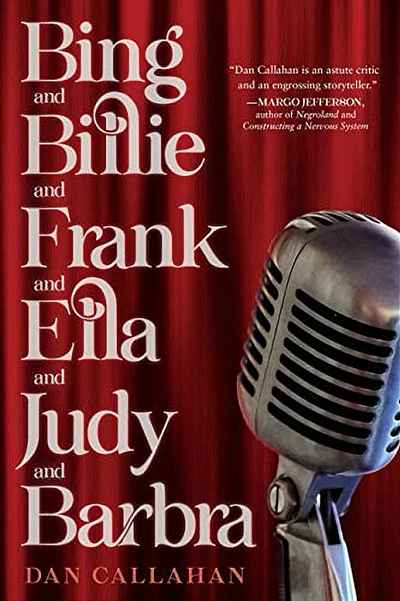Dan Callahan
-
Bing and Billie and Frank and Ella and Judy and Barbra
published: 25 /
10 /
2023

Eoghan Lyng reflects on Dan Callahan’s ambitious new book about Bing Crosby and some of the other major artists of the 1940 and 1950s.
Article
‘Bing and Billie and Frank and Ella and Judy and Barbra’ and its author, Dan Callahan, are so intensely woven into the fabric of pop culture and demeanour, so perceptive of the geography it enclosed around itself, and so mindful of the pleasures that makes up society that it comes as something of a jolt to understand that the characters in question enjoyed their greatest successes in the 1940s. In other words, they serenaded to the masses ab antiquo, by carving a more stylish and angular form of singing that saw the formation of jazz, ragtime, country and pop, and established a more hurried form of singing that drove audiences away from the more classical stylings to something that was more urbane and human to listen to.
Some of the frenzy from the era was comparable to the arrival of The Beatles, vividly recalled in the pages of this impressively produced biography. Bing Crosby's oeuvre had obscure beginnings, and Callahan himself celebrates the urgency of his vocal stylings: "It’s now or never.”As such, Crosby's rendition of 'Out of Nowhere' feels like something from an era tainted by political upheavals and uncertainties. "Bing’s ardent vocals promised fun and a little trouble," Callahan writes, "and an intensity that left a crooner like Rudy Vallée, with his thin, prim, ghostly voice, in the dust."
Born to a Catholic mother, Crosby spent much of his recording career absolving himself from his past misgivings and misdirections. (By the time he recorded Christmas favourite 'Little Drummer Boy' with David Bowie, Crosby had become a staple of religious fortitude.) His vocals had the trappings commonly associated with jazz, which is why Billie Holiday was the perfect person to continue on the narrative further into the decade.
Like vocalists of her persuasion, Holiday faced racial discrimination in a country that had yet to qualify the progressive attitudes Europe admired them for. Holiday's vocals were fiery, dynamic and bolstered by a desire to witness change during her lifetime. The vocalist was worldly beyond her years (pianist Bobby Henderson was shocked to find out she was only sixteen when they met), but had harnessed a vocal style by the 1940s, while Ella Fitzgerald - arguably the closest thing she had to a direct contemporary - was finetuning her voice.
But Callahan doesn't discriminate between the two vocalists; he peers at their development with equal curiosity. Furthermore, he casts off the veneer that has clouded Frank Sinatra for decades, demonstrating the singer as a fragile and frenzied being behind the immense fame. In the 1990s, Sinatra enjoyed a late creative re-birth with the Duets album, even nabbing Kevin Godley and Bono to work with him on the kaleidoscopic 'Under My Skin' video.
The secret of Callahan's hold on the readers is that ‘Bing and Billie and Frank and Ella and Judy and Barbra’ doesn't aim to introduce them to an era that will soon be lost to the annals of time, but contextualises the immediacy and gifts that the singers exhibited to their fans. An ardent vitality is Callahan's desire to explore his subjects without prejudice or bias. In an interview with Sheila O'Malley, Callahan explained the hills he had to climb over to publish a book on Crosby. ("In promoting these six singers on Facebook," Callahan explained,"a lot of people don’t like Bing at all. I’ve had comments like, 'Bing stunk as a singer.'") Adopting Crosby's domestic life as a launching pad, Callahan carefully maps out a country exploring the temptation of music, between the precipices of two World War's and a governing party that had cast off the shackles of prohibition for trendier and more coetaneous laws.
So, how does it measure ? Well, it's an ambitious overview of six aspiring artists, and at 370 pages (in the edition I was sent), it is guilty of overreaching beyond its means. But what an overreach it is, showcasing the era through a series of scintillating observations and remarks. In a humorous anecdote, Sinatra is frustrated to discover that the newly elected John F Kennedy won't be staying with him: “'So why didn’t you tell me this on the first call?' Frank asked, his face getting redder. Lawford tried to say that Frank had cut him off without giving him a chance. 'So where, where?' Frank asked. There was a silence on the other end. And then Lawford said, 'He’s staying with Bing Crosby.' ”